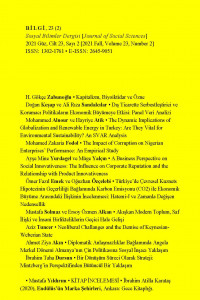Öz
The aim of the study is to explain the becoming transient of human partnerships based on the social theories of Bauman and Giddens. In order to achieve the purpose in question, a qualitative study was conducted and the literature review was applied to. As a result of the study, it has been understood that in societies living under advanced capitalism, the relations of individuals with objects in line with the "use-throw" principle also affect and change their human partnerhips. It has been determined that the acceleration of the object cycle causes transient relationships to gain weight in human partnerships. It has been determined that the acceleration of the object cycle causes transient relationships to gain weight in human partnerships. Individuals have seen long-term partnerships and close attachments as a situation that restricts their freedom of movement, prevents new opportunities, is frightening and should be avoided. Thus, they oriented towards transient partnerships, which Bauman conceptualized as "fluid love" and Giddens as "pure relationship". The transience of human associations has led to the change of the family institution and its replacement by more transient “flexible” or “part-time couples”. On the other hand, in some studies, it has been stated that these new types of partnerships are "too shallow", "unhealthy" and "not satisfactory". Therefore, it has been concluded that individuals should turn to partnerships based on love and affection and avoid excessive attachments in order to protect themselves from the risks of transient partnerships and to prevent the deconstruction of the family institution, which performs important functions in society.
Anahtar Kelimeler
Kaynakça
- Referans 1 BAUMAN, Zygmunt (2000), Postmodernlik ve Hoşnutsuzlukları, Çeviri: İsmail Türkmen, İstanbul: Ayrıntı Yayınları.
- Referans 2 BAUMAN, Zygmunt (2005), Bireyselleşmiş Toplum, Çeviri: Yavuz Alogan, İstanbul: Ayrıntı Yayınları.
- Referans 3 BAUMAN, Zygmunt (2011a), Akışkan Modern Dünyadan 44 Mektup, Çeviri: Pelin Siral, İstanbul: Habitus Yayıncılık.
Öz
Çalışmanın amacı, insani birlikteliklerin geçici hale gelişini, Bauman’ın ve Giddens’ın sosyal teorilerinden hareketle izah etmektir. Söz konusu amacı gerçekleştirebilmek için nitel bir çalışma yapılmıştır ve literatür taramasına müracaat edilmiştir. Çalışmanın sonucunda ileri kapitalizm koşullarında yaşayan toplumlarda, bireylerin nesnelerle olan “kullan-at” ilkesi doğrultusundaki münasebetlerinin insani birliktelikleri de etkilediği ve onları değiştirdiği anlaşılmıştır. Nesne çevriminin hızlanmasının, insani birlikteliklerde geçici ilişkilerin ağırlık kazanmasına yol açtığı tespit edilmiştir. Bireyler uzun süreli birliktelikleri ve sıkı bağlıkları hareket serbestliklerini kısıtlayan, yeni fırsatları engelleyen, korkutucu ve kaçınılması gereken bir durum olarak görmüşlerdir. Böylece Bauman’ın “akışkan aşk”, Giddens’ın ise “saf ilişki” diye kavramsallaştırdığı gerçici birlikteliklere yönelmişlerdir. İnsani birlikteliklerin geçici hale gelmesi ise aile kurumunun değişimine ve onun yerini daha geçici “esnek” veya “yarı zamanlı çiftlerin” almasına yol açmıştır. Öte yandan kimi araştırmalarda bu yeni tarz birlikteliklerin “çok sığ”, “sağlıksız” ve “tatmin edici olmadıkları” da dile getirilmiştir. Dolayısıyla hem geçici birlikteliklerin risklerinden korunmak hem de toplumda önemli işlevleri yerine getiren aile kurumunun yapıbozumuna uğramasını engellemek için bireylerin aşka ve sevgiye dayalı birlikteliklere yönelmeleri ve aşırı bağlıklardan kaçınmaları gerektiğini sonucuna ulaşılmıştır.
Anahtar Kelimeler
Kaynakça
- Referans 1 BAUMAN, Zygmunt (2000), Postmodernlik ve Hoşnutsuzlukları, Çeviri: İsmail Türkmen, İstanbul: Ayrıntı Yayınları.
- Referans 2 BAUMAN, Zygmunt (2005), Bireyselleşmiş Toplum, Çeviri: Yavuz Alogan, İstanbul: Ayrıntı Yayınları.
- Referans 3 BAUMAN, Zygmunt (2011a), Akışkan Modern Dünyadan 44 Mektup, Çeviri: Pelin Siral, İstanbul: Habitus Yayıncılık.
Ayrıntılar
| Birincil Dil | Türkçe |
|---|---|
| Bölüm | Makaleler |
| Yazarlar | |
| Yayımlanma Tarihi | 30 Kasım 2021 |
| Gönderilme Tarihi | 18 Ekim 2021 |
| Yayımlandığı Sayı | Yıl 2021 Cilt: 23 Sayı: 2 |
Twitter Google Akademik Academia.edu
@DergisiBilgi Bilgi Dergisi Google Akademik Hesabı Bilgi Dergisi Academia.edu Hesabı

Bu eser Creative Commons Atıf 4.0 Uluslararası Lisansı ile lisanslanmıştır.


